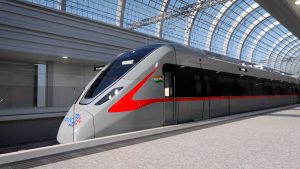 Alstom has begun manufacturing the RRTS train which will operate the future Delhi-Ghaziabad-Meerut semi-high-speed rail corridor.
Alstom has begun manufacturing the RRTS train which will operate the future Delhi-Ghaziabad-Meerut semi-high-speed rail corridor.
The first look of the train for India’s first Regional Rapid Transit System (RRTS) was unveiled in September 2020. Inspired by Delhi’s iconic monument, The Lotus Temple, the fresh, modern and advanced look of the new trains resonate a unique amalgamation of sustainability and India’s rich heritage. These energy efficient semi-high-speed aerodynamic trains will incorporate latest tech features to provide a superior passenger experience, to all commuters, including the specially-abled.
These trains have been developed with the vision to transform the future of regional commute for passengers in India. The RRTS corridors will operate the fastest trains in India with a design speed of 180 kmph. Right ergonomics, safety, low life cycle costs and high recyclability also contribute towards making these trains an attractive sustainable choice to promote public transport thereby reducing traffic congestion and air pollution significantly.
In accordance with India’s ‘Aatmanirbhar Bharat’ vision and the Make-in-India guidelines, the RRTS train fleet is 100% indigenously manufactured, with over 80% localisation and are being manufactured in Alstom’s factory in Savli (Gujarat). This facility will produce the bogies, car bodies and undertake train testing. The propulsion systems and electricals are being manufactured at the company’s factory in Maneja (Gujarat).
In May 2020 Alstom was awarded the contract to deliver 30 six-car regional commuter trainsets and 10 intracity mass transit trainsets of three cars each. Under the EUR 314 million contract, Alstom will design, build, and deliver 210 coaches and will provide comprehensive maintenance services for 15 years. In January, Alstom won a EUR 106 million contract which includes the design, supply, installation, testing and commissioning of signalling and train control, supervision, platform screen doors and telecommunication systems for the 82.15 km corridor. This line will be the first in India to adopt the ETCS hybrid Level 2 signalling system, which is the core signalling and train control component of the ERTMS.
Share on:



